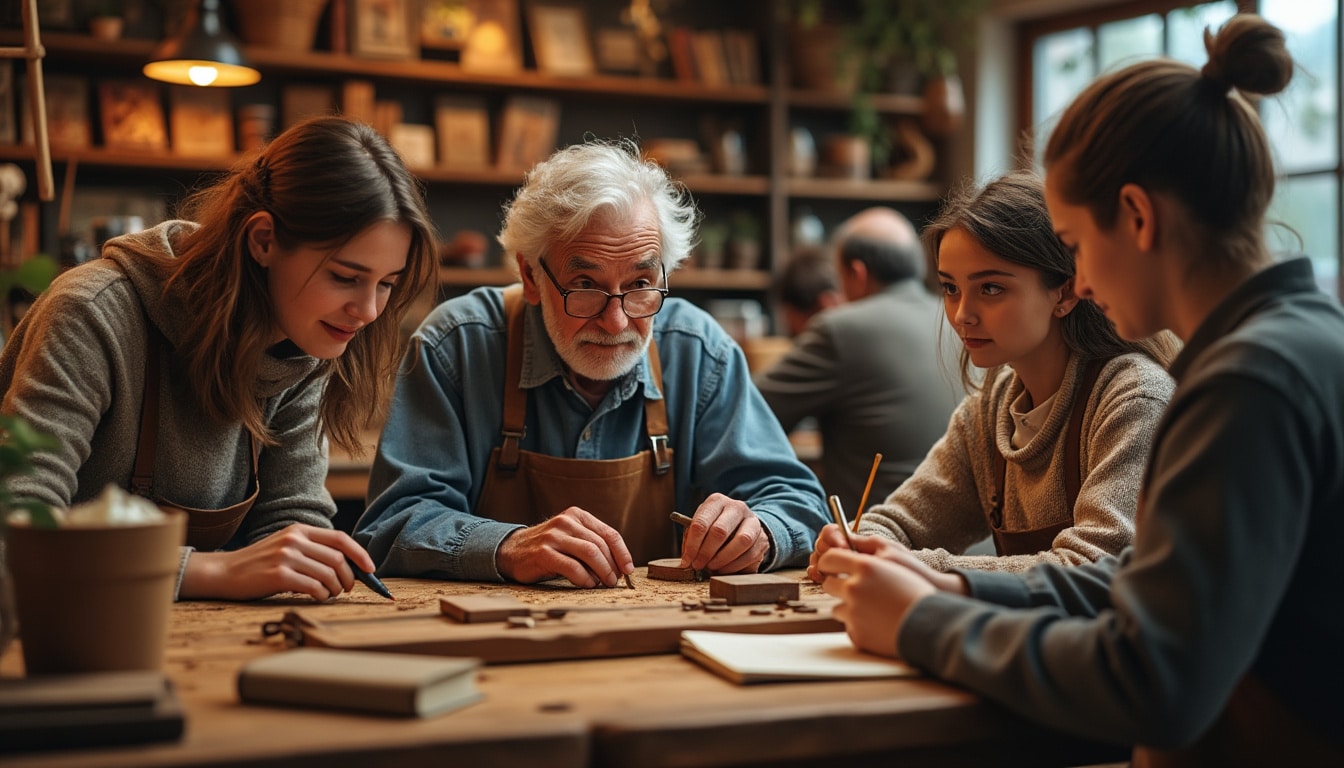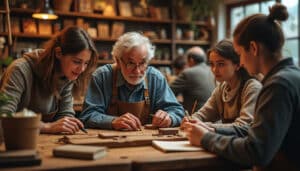Life skills evolve over time, leaving behind know-how that was once essential. In our modern society, certain abilities that were once common tend to disappear. These changes reflect technological evolution and new lifestyle habits.
Yet, it is fascinating to see how certain skills, once essential, are now almost forgotten. For example, the art of using a telephone with a handset, a skill that I practiced myself as a switchboard operator in my early days. Today, watching a scene of a switchboard in an old movie evokes in me a deep sense of nostalgia and appreciation.
Recently, during a conversation with my friend Susan, a linguistics professor, she shared a funny anecdote about using analog time. Her students literally took her instructions to return to “quarter past one” to mean 2:25, illustrating the increasing difficulty in understanding these traditional concepts. Similarly, my nephew, a father of two, confided that his sons, aged 12, could no longer read the time on an analog clock, a skill now considered obsolete.
In addition to reading the time, other skills seem to be gradually disappearing. Cursive writing, for example, is declining in schools, replaced by digital typing. Mastery of manual transmissions in vehicles is disappearing in favor of automatic gearboxes, simplifying driving but erasing a once-valued skill. Even home sewing, once a necessity, is experiencing a revival, driven by creativity and a quest for quality in face of mass-produced clothing.
These evolutions prompt us to reflect on the skills we value and those we leave behind. What expertise did you once have, and what do you now see fading away? Share your thoughts and observations in the comments below.

What once-essential skill is now forgotten?
In our digital age, many skills once indispensable seem to be gradually fading. Everyday life skills that were once rooted in our routines are now almost extinguished. Take the example of telephone switchboard operators, a common profession several decades ago. Once, telephone lines were managed manually, requiring specific expertise to connect calls. Today, this role has been largely automated, rendering this skill obsolete.
I remember when I was an operator at my college switchboard. Every movement was calculated, every gesture precise. Today, seeing a scene of a telephone switchboard in an old film makes me think back to that bygone era. A younger friend once asked me, while watching such a film, what was actually happening. This anecdote perfectly illustrates how some skills, though crucial in the past, no longer have their place in our modern daily life.
But it’s not just telecommunications that have undergone this transformation. Skills such as analog time mastery also seem to be lost. My friend Susan, a linguistics professor, recounts that she often asks her students to return to a certain hour. But they misinterpret, thinking of money amounts rather than exact time, thus revealing a misunderstanding of basic concepts like “a quarter of an hour.” Even the younger ones, equipped with modern technology, sometimes struggle to read a traditional clock.
What other skills are now outdated?
The rapid evolution of technology has left behind a number of once-common skills. Cursive writing, for instance, has been largely replaced by typing and the use of digital keyboards. Yet, learning to write by hand still has its merits, especially for memory and creativity.
Similarly, driving vehicles with manual transmission is becoming increasingly rare with the advent of automatics. Although these skills are no longer necessary for most drivers, they can still represent an advantage in certain situations or regions. Mastering such skills showcases an ability to adapt and continuous learning.
Home sewing is another striking example. Once an essential skill for every household, it is now declining. However, a resurgence in sewing craftsmanship has recently emerged, fueled by a desire for unique clothing and awareness of the costs associated with fast fashion. This renaissance is partly due to the boredom caused by the Covid-19 pandemic and a growing desire for sustainability and personalization in our wardrobes.
These outdated skills are not necessarily lost forever. Movements such as vintage show a reluctance to let the past dissolve completely, seeking to preserve and reintroduce certain practices into our modern life.
How does technology influence the forgetting of these skills?
Technology plays a central role in redefining our daily skills. On one hand, it facilitates the acquisition of new knowledge and skills; on the other, it can render certain practices obsolete. For example, the use of smartphones and scheduling apps has reduced our need to read the time on an analog watch, leading to a loss of this analog skill.
Moreover, automation and artificial intelligence are replacing many tasks traditionally performed by humans. This includes not only jobs like telephone switchboard operator but also more subtle skills like navigation using paper maps or basic mechanical repair. This increasing reliance on technology can hinder our resilience in case of technological failure.
Nevertheless, technology also offers ways to preserve and revitalize certain skills. For instance, online educational platforms allow learning manual or artistic skills that were once passed down through generations. Initiatives like the Silver Generation leverage decades of individuals’ experience to fill skills gaps in the global economy, thereby showing how technology can be a catalyst for a revival of forgotten crafts.
Furthermore, emerging technologies such as augmented reality and virtual reality provide immersive ways to learn and practice skills that were once neglected, making learning more interactive and engaging.
What future for traditional skills in a modern world?
The future of traditional skills depends on a balance between adaptation and preservation. Rather than letting these skills disappear completely, it is possible to integrate them in a way that makes them relevant in our current society. For example, animal therapy, an ancient practice of interacting with animals to improve mental well-being, is experiencing resurgence thanks to better understanding its benefits and contemporary research supported by studies such as those available on this resource.
Additionally, intergenerational collaborations can play a crucial role. Sharing skills between generations allows valuable knowledge to be passed down while enriching everyone’s perspectives. Educational programs and community workshops can facilitate this exchange, ensuring that traditional skills are not simply forgotten but adapted and revitalized to meet current needs.
It is important to recognize the intrinsic value of these skills and find innovative ways to preserve and adapt them. For instance, home sewing can be modernized with contemporary techniques or sustainable materials, thus meeting a growing demand for unique and environmentally friendly items.
In parallel, initiatives like the understanding of vintage not only help preserve the history of old skills but also inspire new forms of creation and innovation.
What impacts does the forgetting of these skills have on our society?
The gradual forgetting of certain skills has profound repercussions on our society. First, it can lead to a loss of cultural diversity and heritage. Traditional skills often reflect the history and values of a community. Their disappearance also means losing stories and practices that have shaped our collective identity.
Moreover, increased dependency on technology and automation can diminish our resilience in the face of challenges. For instance, if our society forgets how to cope without technology, it becomes vulnerable in the event of widespread failures or emergencies where modern technologies are unavailable.
Furthermore, the disappearance of certain skills may limit our capacity for innovation. Traditional skills, often based on centuries of experience and practice, can inspire new approaches and solutions in various fields. By losing these skills, we risk missing out on innovation opportunities rooted in the wisdom and experience of the past.
To counter this, it is essential to value and promote continuous learning, integrating traditional skills into educational curricula and vocational training programs. This way, we ensure intergenerational transmission of knowledge and skills, guaranteeing their relevance and application in a modern context.
Finally, preserving traditional skills fosters greater diversity of skills within society, thereby enriching our collective ability to solve complex problems and adapt to constantly evolving environments.
How can we revitalize outdated skills today?
Revitalizing outdated skills requires a proactive and multidimensional approach. First, it is crucial to raise public awareness about the importance of these skills and their potential benefits. Awareness campaigns, community workshops, and educational programs can play a key role in this effort.
Next, integrating these skills into modern educational programs is essential. For example, sewing courses, analog relaying, or maintenance of manual transmission vehicles could be reintroduced in schools and vocational training centers. This not only preserves these skills but also adapts them to contemporary needs and contexts.
Furthermore, encouraging innovation and creativity around these skills can make them more appealing to current generations. For instance, merging traditional sewing techniques with modern designs or using analog relaying skills for artistic projects can breathe new life into these practices.
Moreover, online platforms and virtual communities can facilitate the sharing of knowledge and experiences. Tutorials, discussion forums, and practice groups allow individuals to learn and refine these skills flexibly and accessibly.
Finally, supporting entrepreneurial initiatives that harness these skills can create new economic and social opportunities. Artisans using traditional skills to create unique products or educators offering specialized workshops contribute to keeping these know-how alive and relevant.
In summary, revitalizing outdated skills requires a combination of awareness, education, innovation, and community support. By adopting a holistic approach, we can not only preserve these skills but also dynamically integrate them into our modern society.
What are your examples of outdated skills and how have you seen them evolve?
Outdated skills vary widely across cultural and technological contexts. Among the often-mentioned skills are handwriting, hand saw, navigation using physical maps, and of course, mastery of manual telephone switchboards. These skills, though rare today, still exist in certain niches or cultures.
Personally, I have observed a surprising resilience in certain skills. For example, home sewing, though less common than before, is experiencing a revival thanks to a return to artisanal practices and environmental awareness. Similarly, skills like basic mechanical repair are being rediscovered by hobbyists and DIY enthusiasts looking to reduce their reliance on external services.
These observations show that, even if certain skills may seem obsolete, they often find new vocations or transform to meet contemporary needs. This underscores the importance of not underestimating the intrinsic value of these know-hows and seeking innovative ways to integrate them into our daily lives.
And you, what outdated skills have you noticed in your everyday life? How have you seen them evolve or transform? Share your thoughts and observations in the comments below.
Additional resources and recommended readings
For those who wish to delve deeper into the topic and explore further the implications of outdated skills in our modern society, here are some useful resources:
- The Silver Generation: Leveraging Decades of Experience
- Understanding Vintage: Definition and Issues
- EY The Golden Age Foundation and the Institute of Emerging Markets
- How Technology Can Bridge the Care Gap
- Understanding Animal Therapy: Definition and Benefits
These articles provide an in-depth perspective on how traditional skills interact with current and future trends, offering insights for a better understanding and integration of these know-hows in our ever-evolving world.
Join the discussion
Your opinion matters! What outdated skills have you observed in your everyday life? What do you think are the skills on the verge of disappearing? Share your thoughts and engage in this essential conversation in the comments below.









